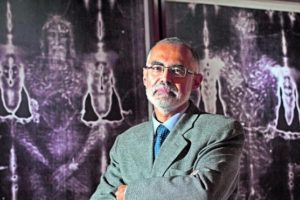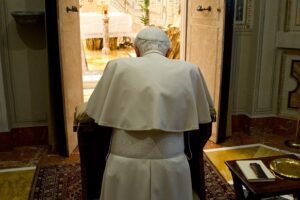Mission: Asia. The New Frontier of the Society of Jesus
ROMA, January 23. 2008 – There is an element of continuity between Fr. Adolfo Nicolás (in the photo), elected four days ago as the new superior general of the Society of Jesus, and his predecessor from 1956 to 1983, Pedro Arrupe.
Both were born in Spain, and both worked for many years in Japan.
Fr. Giuseppe Pittau, who was interim director of the Society of Jesus during Arrupe’s illness, also worked in Tokyo for a long time, where he was rector of Sophia University, founded by the Jesuits in 1913.
The new superior general, Adolfo Nicolás, 71 years old, has lived in the Far East since 1964, mainly in Tokyo, working as a theology professor at Sophia University, as provincial of the Jesuits in Japan, and most recently, from 2004 to 2007, as moderator of the conference of Jesuits of East Asia and Oceania. Apart from Spanish, Italian, English, and French, he speaks fluent Japanese.
This link between the recent successors of Saint Ignatius of Loyola and the Far East demonstrates fidelity to the origins of the Society – to Saint Francis Xavier, the first great evangelizer of these lands – but also the desire to be present on a crucial frontier for today’s Church, that of the missions in Asia.
Asia is today the least Christianized of the five continents. But it wasn’t always this way. From the very beginning, one of the great directions for the expansion of Christianity was precisely toward the East, all the way to Persia, India, and China. From its origins, Christianity was not a European phenomenon that was then exported as such to other civilizations, but a faith interwoven with numerous cultures.
Pope Benedict XVI, although he staunchly reaffirms the primordial grafting of biblical faith onto Greek philosophy, has often emphasized this «cultural pluriformity» of Christianity from its beginnings.
The last time he did this was at the general audience of Wednesday, November 28, 2007. At the beginning of his catechesis for the faithful, dedicated that day to illustrating the figure of a Father of the Syrian Church, Saint Ephrem, the pope looked up from his written text and said, improvising:
«Dear brothers and sisters, common opinion today supposes Christianity to be a European religion which subsequently exported the culture of this Continent to other countries. But the reality is far more complex since the roots of the Christian religion are found in the Old Testament, hence, in Jerusalem and the Semitic world. Christianity is still nourished by these Old Testament roots. Furthermore, its expansion in the first centuries was both towards the West – towards the Greco-Latin world, where it later inspired European culture – and in the direction of the East, as far as Persia and India. It thus contributed to creating a specific culture in Semitic languages with an identity of its own. To demonstrate this cultural pluralism of the one Christian faith in its origins, I spoke in my catechesis last Wednesday of a representative of this other Christianity who is almost unknown to us: Aphraates, the Persian sage. Today, along the same lines, I would like to talk about St Ephrem the Syrian . . .»
What, in this regard, is the vision of the new superior general of the Jesuits, Adolfo Nicolás?
To understand this, it is helpful to reread an article he published in issue number 3, 2005, of the international theology journal «Concilium,» a magazine that upholds positions on the relationship between Christianity and the other religions and cultures that are not always compatible with official doctrine.
In effect, in this article Fr. Nicolás writes that the Church has the duty of recognizing «the religious wealth of other religions and the real and actual salvation they have brought to a thousand generations»: an idea that would raise the eyebrows of a few prelates at the Vatican congregation for the doctrine of the faith.
But what is of greater interest in the article by Fr. Nicolás are not the answers that he gives, but the questions that he poses. These are to a great extent open questions, which he urges should be faced with «impartial service, without conditions, because only God is strength,» as he said in his first homily as superior general of the Jesuits, at the Church of the Most Holy Name of Jesus in Rome on Sunday, January 20.
In this spirit, Fr. Nicolás says he is also ready to face apparent failures. Following the second world war, the Jesuits were convinced that Japan was fertile ground for a great missionary expansion. For this reason, they sent top-notch personnel to the country. But the massive conversions to the Catholic faith didn’t happen.
Japan is not the only crucial frontier for Christianity in Asia. But in any case, it is coming under increasing attention from the Church of Rome. A sign of this attention will come on November 24, 2008, with the beatification in Nagasaki of the Jesuit Peter Kibe Kasui and his 187 companions, martyred between 1603 and 1639.
Here, then, is an extract from the article published in issue number 3, 2005, of «Concilium» by the Spanish-Japanese Jesuit who is now the new superior general of the Society founded by Saint Ignatius:
Christianity in Crisis: Asia
by Adolfo Nicolás
[… The crisis of Christianity in Asia is not new. [… Christianity has been in crisis in Asia every time there was real encounter. If we just look at modern times Francis Xavier started a crisis for Christianity when he opened dialogue with the Buddhist Bonzes in Japan. Valignano further deepened it. Ricci, Ruggieri, de Nobili, and so many others, who wanted to truly engage the local culture, religiosity and community, they all initiated a crisis that eventually transcended the local situation and challenged the whole Church. […
In this kind of crisis we are transformed from “judging” others to “being judged” ourselves. Not because “the others” are interested in judging us, but because in their presence “our own words come back to judge us”. The Other judges us by listening to our message and confirming its depth, its power to invite and change. The Other judges us by taking our words seriously and becoming a witness to our lives. The Other judges us by forcing us to keep the deeper questions alive and not allowing words to confuse reality. When The Other is welcomed with love and respected in his or her integrity, we cannot avoid feeling challenged to ask ourselves how true, how christian, how much of a disciple we are. […
The crisis is lessened whenever we are blessed with the existence of holy persons like Mother Theresa or many other Christians giving their lives for the sake of others. But we have also ‘known and unknown’ thousands who live a life of compassion and service in Other Religions. […
In Asia we are in crisis because our message is not made visible in our life. The Gospel of mercy and reconciliation is denied by our inability to fully reconcile. [… The joy and simplicity of forgiveness and service have given way to a complicated system of controls and regulations that make the Gospel somehow distant from people. In the Western or older Churches there is a possibility of explaining why and how some of these anomalies developed; in a heart-to-heart conversation with people of Other Religions in Asia those very explanations provoke only wonder and disappointment.
The natural field for this crisis is the Pastoral field, where, to our own sh
ame and consternation, norms and obligations seem to occupy much more space in preaching and directives from the Pastors than joy, hope and freedom; where learning (often less than intelligible and seldom interesting) doctrines occupies more space than communion, service and hospitality. […
Pastoral work is an ongoing invitation to become empty of the self, to become a “recipient” for the other with his or her worries, joys, questions, despair or hopes. The relationship “Service” – “Emptiness” is so pertinent that Paul does not hesitate to apply it to Jesus-Christ in several letters. It is also a relationship that makes full sense in Asian Buddhist Tradition. Thus, when, in Asia, we choose to become a successful Pastor, rather than a self-emptying and self-giving one, we lose something of our nature in Christ. We are in crisis.
The crisis is no better in what touches Theology. Asian Religions – especially Buddhism – are an ongoing challenge to every theological word we produce. They put into question the supposed “clarity” of many of our statements and explanations. Basically because it is a clarity without transparency that explains better concepts and definitions than life with all its pains and joys. This critical sense towards religious language is not uniquely Asian. Cardinal Ratzinger in one of his writings on Christian faith stated several decades ago that ‘all theological statements have only an aproximate value’ or something of the sort. This wise and inspiring affirmation would find in Asian Religions its deepest assent and most radical interpretation.
At the same time, Asian thinkers steeped in their religious traditions continue to wonder at the ambiguity and lightness with which we use terms as central and as important as “salvation”, “faith”, “liberation”, and the like. The kind of theology that has become normal currency in our seminaries has remained distant from the life of people in East and West; it takes a double distance when used in Asia as if it were “Catholic common sense”. It is a language in tension, in conflict, in disharmony with other religious languages, images, perceptions, symbols and expressions that have given direction, as well as sense and hope to millions. And by being faithful to the methodology of Western academic demands, it has failed to integrate serious knowledge with the more liberating ways of religious wisdom and the experiences, impossible to systematize, of radical emptiness, non-dualism and transcendence. […
The real spiritual Masters of all ages are more keen in teaching the way to God, than in giving answers to questions about God. Asia has produced an incredible wealth of such “Ways”. The search for wisdom or for the Divinity is a very concrete search and the Masters continue to guide people in the journey of the heart. It is in this context that we Christians have to think and reconsider our Christian practices, from simple devotions to Sacramental celebrations.
What is the Christian “Way” in Asian countries? The crisis of our taken for granted spiritual practices should be an invitation to rediscover their original inspiration [… . The Church has to recuperate its humble position in the plan of salvation. Like all human mediations, it is subjected to the law of growth and decay, of sin and grace, of death and resurrection. To pretend otherwise is self-deception and a denial of the Cross and the status of servant that Jesus took for Himself and for all those, people as well as Institutions, who want to follow him to the end. The Church in Asia has been poor often, persecuted in many places and for long periods of time, powerless and almost invisible in not a few places… To their credit, many Bishops and other religious figures in Asia, have been happy with this humble being of the Church. This is the image of the Church of Christ that makes most sense in Asia; a Church at home in the poverty of the masses and the never discriminating hospitality of hope.
And yet this is not the image that we “ecclesiastics” communicate most clearly. There is a yearning for visibility, for influence, for different forms of power (including, especially, “spiritual” power!), for visible success, that spoils the joy of accompanying Christ in poverty and humility. The Church has been very awkward in opening its gates and changing its structures in obedience to the Spirit of Christ speaking to it in Vatican II. Thus in Asia the Church appears often as inconsistent and produces now and then astonishment and disappointment. If we were conscious of the crisis we are in fact traversing, we would reconsider our style, our language, our celebrations in a search for greater harmony.
Asia can never understand how a “humble” Church can so easily dismiss “other ways of salvation” or put them down as “lesser than ours”. Asia, with its Saints and Mystics, its Witnesses and heroic Faithful, will never comprehend how a Church born out of the Gospel and led by the Spirit of Jesus Christ can practically ignore the religious wealth of other Religions and the real and actual salvation they have brought to a thousand generations. […
We have to enter again the Paschal journey of self-emptying; this is our only chance to meet the suffering Christ in the poor of Asia, the victims of millennia of earthquakes, tsunamis, oppresion and injustice. This self-emptying reaches out to our concepts, theologies, institutions, theoretical or devotional worlds… A. Pieris speaks of a new Baptism in Asian Religiosity and the Cross of Asian poverty. [… Just like Jesus who “being rich became poor so that we all share in his wealth”.
The sooner we welcome the crisis and move ahead with the “Creator Spirit”, the better.
__________
The international theology journal, in seven languages, that published the article by Fr. Adolfo Nicolás: Concilium





















